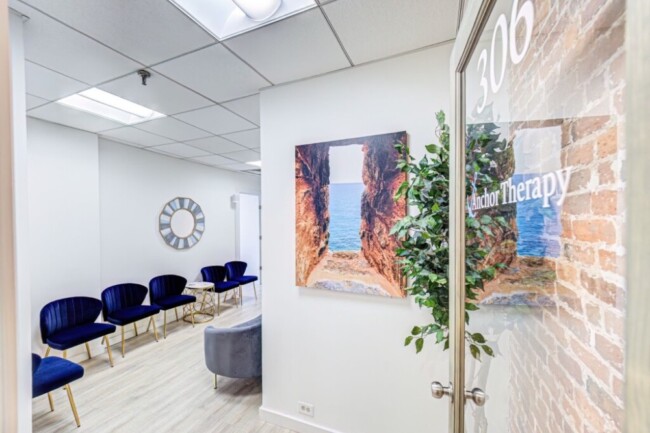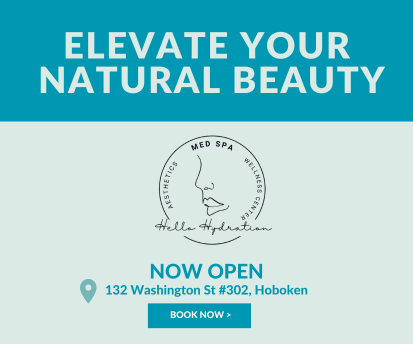Life can be challenging and it’s okay to feel overwhelmed, anxious, or lost sometimes. Starting therapy is a powerful act of self-care so congratulate yourself on taking the first step towards a healthier you. Seeking help is a sign of strength but it is normal to be nervous or not know how to prepare for the first session. Anchor Therapy, located at 80 River Street, Suite 306 in Hoboken, is ready to help you or your child find relief from stress or life’s current struggles. Anchor Therapy is a group of 10 fully licensed psychotherapists and was voted Best Therapist in 2021 and 2022 by The Hoboken Girl readers. Keep reading to learn more about the local practice and some tips on how to prepare for your first therapy session from Courtney Glashow, LCSW, founder and psychotherapist at Anchor Therapy.
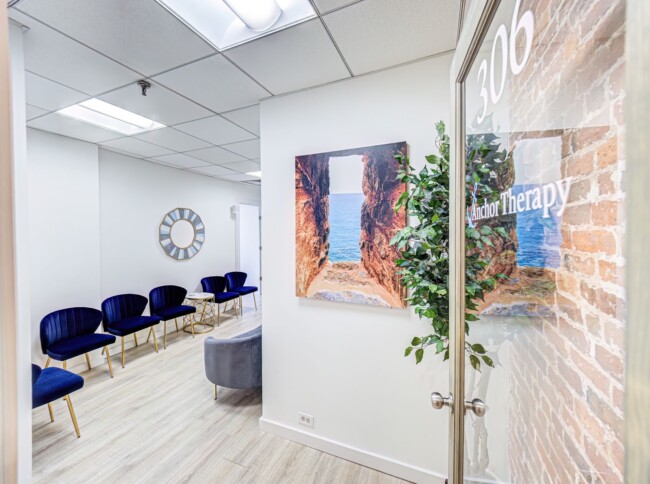
How to Prepare For Your First Session
Deciding to start therapy is a big self-care step and the team at Anchor Therapy has some tips to help you prepare for your first session.
Tip #1: Embrace Your Strength
Seeking out therapy means you want to invest in your well-being and make positive changes. This is a sign of resilience and strength, so start by recognizing and celebrating this courageous achievement.
“Whether you’re dealing with stress, anxiety, life transitions, or simply seeking personal growth, Anchor Therapy is here to support you,” Courtney shared.
Tip #2: Embrace The Unknown
Therapy is not just for addressing problems and it is okay to not know why you want to start.
“Anchor Therapy understands that every individual’s journey is unique, and our therapists are equipped to guide you through various aspects of your life,” Courtney said.
Therapy can help with general self-improvement and personal growth and you don’t have to have a specific concern in mind to begin.
Tip #3: Streamline Your Experience
The Anchor Therapy team encourages patients to complete all of the required paperwork in advance so this doesn’t slow down the first session. This paperwork streamlines the experience and makes the first session feel more focused when beginning your mental health journey with your therapist.
Tip #4: Don’t Worry About Conversation Topics
It’s normal to be worried about what to talk about during the first session, but don’t let this hold you back from starting therapy.
“If you find yourself worried about what to say to your therapist, rest assured that our compassionate professionals are here to guide the conversation. If it eases your mind, jot down a list of topics you’d like to discuss during your session,” Courtney shared.
Tip #5: Therapy is a Collaborative Experience
Therapy is a safe space where patients are encouraged to ask questions and share their thoughts. Courtney said the key to getting the most out of each session is for patients to remain open and honest with their therapist.
Tip #6: Create Space Around Your Session
Virtual sessions can easily get slotted into a busy day but it’s not always the best idea to jump from therapy straight into a meeting. There are alot of emotions and thoughts to process before and after a therapy session. It can be helpful to build in a mini break after the session to have time to reflect and transition into the rest of the day.
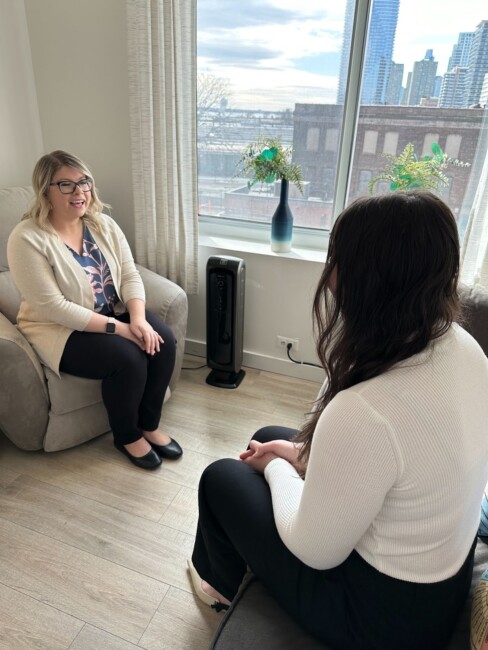
Anchor Therapy Services
Anchor Therapy is a women-owned mental health practice in Hoboken that also provides virtual counseling for residents of New Jersey, New York, Florida, North Carolina, and Utah. The group was founded by Courtney Glashow, LCSW and each member of the 10-person team has a different area of expertise.
“Our therapists at Anchor Therapy are committed to creating a safe space where you can openly discuss your concerns, whether they involve anxiety, depression, life changes, or other challenges,” Courtney said.
Anchor Therapy helps children, teens, adults, seniors, couples, families, and the LGBTQIA+ community with individual counseling and support groups. The team of fully licensed therapists provides a variety of services including:
Addiction and substance abuse counseling: A substance abuse therapist can explore the root cause of addiction and help people develop healthy coping mechanisms.
Anxiety counseling: Anxiety therapists tailor treatments to match the individual’s anxiety disorder symptoms.
CBT (Cognitive-Behavioral Therapy): Anchor Therapy specializes in using CBT, an evidence-based treatment that helps clients identify and change thought and behavior patterns.
Depression counseling: A depression therapist may use behavioral activation therapy to help clients understand how depression is impacting their life and find ways to work through these issues together.
Grief counseling: Grief therapists at Anchor Therapy use CBT and other therapeutic strategies to help clients feel good again after experiencing a loss. Their psychotherapist Rebecca Bischoff, LCSW is currently running a Virtual Grief Support Group for adults that meets on Tuesdays from 7:30PM-8:30PM and is accepting new members. To register or get more information fill out the form on their website.
Life transitions: Life counselors can guide clients through career, family, health, or other lifestyle changes and find ways to develop healthy coping skills.

OCD (Obsessive Compulsive Disorder) Therapy: Anchor Therapy has highly-trained OCD therapists who provide specialized treatments for each individual client.
Play Therapy: Children of all ages can try play therapy as a way to express feelings and emotions. Parent-child counseling is available for kids younger than six years old.
Postpartum Depression: Postpartum depression can start during pregnancy or months after giving birth. Anchor Therapy provides flexible sessions with mental health counselors specifically trained in helping new moms.
Psychodynamic Therapy: Traditional talk therapy can help patients gain a better understanding of their thought and behavior patterns in order to feel better and make better choices.
Trauma counseling: Trauma-informed therapy is a way to understand and cope with emotional and psychological trauma symptoms.
“Maybe you’re not sure why you’re seeking therapy, and that’s completely fine. Even if you’re not sure about a specific concern, therapy can still help you grow as a person,” Courtney shared.

Anchor Therapy’s Seamless Intake Process
Anchor Therapy makes it simple and hassle-free to get started with therapy. Simply fill out the contact form on the website — an intake coordinator will then send a follow-up email with the option to select in-person or virtual care and set the date for the first session.
After the details are confirmed, clients will get another email with the intake paperwork. The licensed mental health counselor will reach out next to confirm the details of the first appointment and a video link sent for virtual sessions.
The first session lasts an hour and sets the tone for future therapy sessions at the local practice. The therapist will learn more about the client’s background, goals, and specific needs during this session.
“It’s a safe space to share and start your journey towards positive change,” Courtney explained.
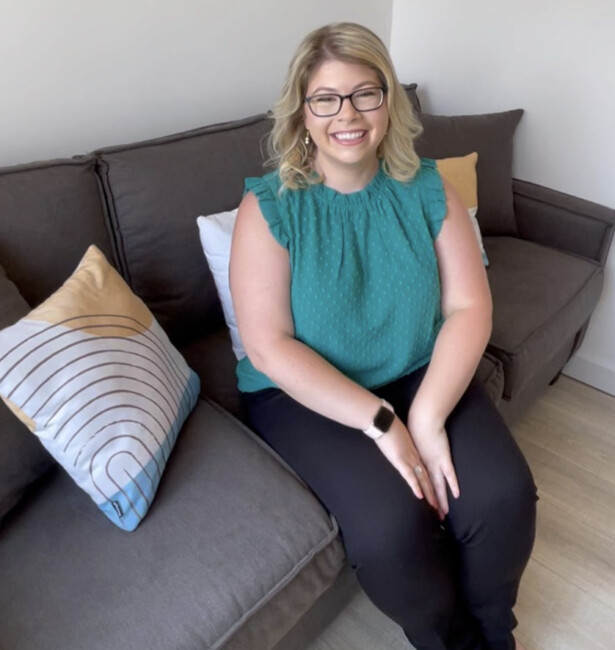
^ Courtney Glashow, Founder of Anchor Therapy
Intake coordinators review every single request and match each person with an Anchor Therapy counselor who best fits their needs. If the match doesn’t fit for any reason, the Anchor Therapy team will refer the person to another professional in the area who can help.
Anchor Therapy is currently accepting new clients so fill out the contact form on the website to get started. Starting therapy is a big step towards better mental health and it’s important to be gentle with yourself along the way.
“Embrace the process, and remember that our compassionate team is here to guide you every step of the way. Take pride in your commitment to self-improvement, and don’t hesitate to reach out to us when you’re ready to embark on this transformative journey. Your mental well-being matters, and we’re honored to be part of your path to positive change,” Courtney shared.

Anchor Therapy is located at 80 River Street, Suite 306 in Hoboken. You can fill out the contact form on their website to get more information or schedule an appointment.

